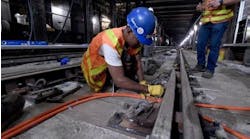Chicago Transit Board expands contracting opportunities for local small businesses
A new mid-level construction (MidCon) contract was approved by the Chicago Transit Board, allowing pre-qualified contractors to pursue contracting opportunities with the Chicago Transit Authority (CTA).
This new contract features a two-tiered approach that increases opportunities for more Disadvantaged Business Enterprise (DBE) certified firms to work as prime contractors – further extending the value and impact of transit investments into the communities served by the CTA.
“Having the ability to participate in CTA contracts can really contribute to the economic growth of a community and provide an abundance of opportunities that small businesses may not normally have a chance to pursue,” said CTA President Dorval Carter, Jr. “Investments in public transit are also investments in the communities we serve and can provide long-lasting, positive impacts on a community for years after the work is complete.”
Traditionally, the MidCon contract allows pre-qualified contractors to bid on smaller and less complex CTA projects that are typically less than $15 million. The new contract maintains this while providing a two-tiered approach for qualifying Tier I firms to bid on larger projects that are more than $3 million, and qualifying Tier II firms to bid on projects that are under $3 million. Projects included under this contract can entail repairing and/or constructing CTA infrastructure, including but not limited to bus and rail facilities, elevated structure, tracks, signal and power systems and more.
This contract will incorporate the DBE best practices used for other CTA task-order contracts, which includes a Diversity Outreach Plan as part of the bid evaluation as well as review of the contractor’s past DBE performance. Other CTA DBE commitments will also be included, such as outreach and mentor-protégé, and a commitment around workforce training and development.
To maximize DBE participation throughout the life of the contract, each task order will have an established DBE goal and contractor commitment, which will provide DBEs with greater exposure to multiple prime contractors while also bringing in new DBEs into project work.
The contracts will include language for workforce goals to be included when it’s possible. Providing fair access to jobs and training opportunities to DBEs increases their chances to participate in CTA contracts. These investments in the community can generate economic growth for future generations.


